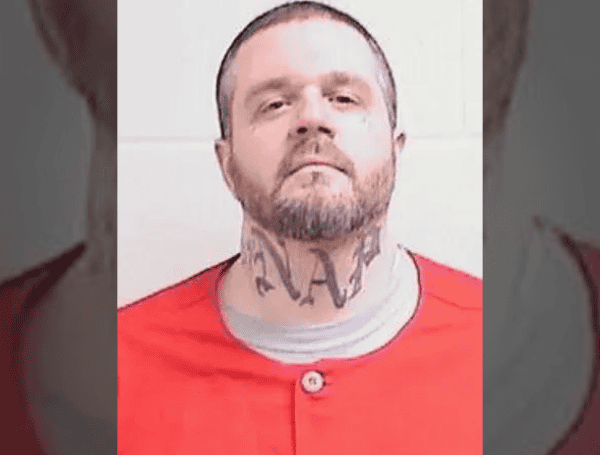Barring any last-minute legal intervention, Indiana is scheduled to carry out its second execution in 15 years early Tuesday morning. Benjamin Ritchie, 45, is slated to receive a lethal injection at the Indiana State Prison for the murder of Beech Grove Police Officer Bill Toney in 2000.
Ritchie was convicted of fatally shooting Officer Toney during a foot chase that ensued after Ritchie and others stole a van in Beech Grove, a town near Indianapolis. At the time of the crime, Ritchie, then 20 years old, was on probation for a prior burglary conviction from 1998.
Officer Toney, 31, a married father of two, had served with the Beech Grove Police Department for two years. His death marked the first time an officer in the roughly 30-person department was killed by gunfire in the line of duty, sending grief through the close-knit community of 14,000 residents.
READ: Florida Executes ‘Morbidly Obese’ Michael Tanzi For Brutal 2000 Murder Of Janet Acosta
“Everyone of us involved, including Bill, had something stolen from them that they’ll never get back,” reflected Deputy Police Chief Tom Hurrle, who worked alongside Toney, NBC News reported.
The impending execution has reopened wounds for Toney’s family. At a clemency hearing last week, his widow, Dee Dee Horen, urged the state to proceed. “It’s time. We’re all tired,” she stated. “It is time for this chapter of my story, our story, to be closed. It’s time for us to remember Bill, to remember Bill’s life, and not his death.”
Ritchie’s defense attorneys have mounted numerous challenges to his death sentence, arguing that his trial counsel was ineffective for failing to adequately investigate and present evidence regarding his fetal alcohol spectrum disorders and childhood lead exposure. They contend that Ritchie suffers from “severe brain damage” due to his mother’s substance abuse during pregnancy, leading to impaired decision-making. He was also diagnosed with bipolar disorder in 2005.
“He’s finally come to have some coping skills. He’s a different man,” argued defense attorney Steven Schutte.
READ: Florida Death Row Inmate’s Last Words: “Trump, Keep Making America Great”
However, Republican Governor Mike Braun rejected Ritchie’s clemency bid last week, aligning with the parole board’s recommendation. While Braun did not elaborate on his decision, the parole board cited a dozen disciplinary violations Ritchie incurred during his two decades in prison, including threats of violence.
The Indiana Supreme Court also denied a request to halt the execution, although two justices acknowledged that the jury did not receive complete information about Ritchie’s brain damage. Ritchie’s legal team is now pursuing appeals in federal court and has filed a petition with the U.S. Supreme Court. Disability rights advocates have also argued that Ritchie’s cognitive impairments should exempt him from the death penalty.
Dr. Megan Carter, who testified before the parole board, stated that Ritchie’s “capacity to fully appreciate the wrongfulness of his conduct” was “impaired at the time of his crime.”
Ritchie has reportedly expressed remorse for his actions in the years since his conviction. He told the parole board of his deep regret, particularly for his behavior towards Toney’s widow in court. “I wish I could go back to the day in court, because that man’s wife deserved to say everything she needed to say to me, and that punk kid should have just kept his mouth shut and let her say whatever she needed to say,” Ritchie said. “That was her right. That was his family’s right.”
READ: Lake County Man Gets Life In Prison; Victim Previously Targeted In Polk County Kidnapping
Ritchie has spent his final days visiting with friends and family. Under Indiana law, he is permitted up to five witnesses at his execution, including his attorneys and friends.
Indiana resumed executions in December after a year-long pause due to the nationwide scarcity of lethal injection drugs. The state notably bars media witnesses from executions, a practice that has drawn criticism and a federal lawsuit from the Associated Press and other media organizations. Indiana is one of only two states with the death penalty that prohibits media access, the other being Wyoming, which has carried out only one execution in the past 50 years.
Ritchie’s scheduled execution is one of 12 set to take place in eight states this year, with two other executions scheduled this week in Texas and Tennessee. As the clock ticks down, the focus remains on whether any last-minute legal challenges will halt the state’s plans to execute a man who has spent over two decades on death row for a crime that deeply scarred a community.
Please make a small donation to the Tampa Free Press to help sustain independent journalism. Your contribution enables us to continue delivering high-quality, local, and national news coverage.
Connect with us: Follow the Tampa Free Press on Facebook and Twitter for breaking news and updates.
Sign up: Subscribe to our free newsletter for a curated selection of top stories delivered straight to your inbox.
